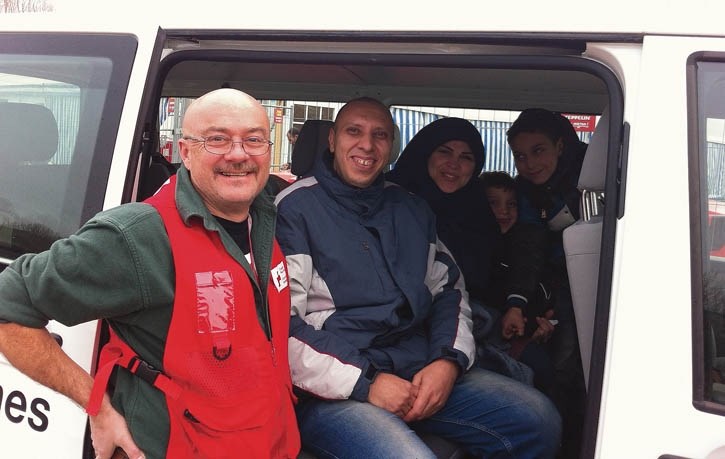While the plight of Syrian refugees has been a top news story around the world for some time, a Canmore man recently experienced the situation up and close and personally.
Dave Bateman, director of clinical programs at the Prostate Cancer Centre in Calgary, worked at a refugee camp in Erding, Germany, from Nov. 13 to Dec. 15, where 600 to 1,000 new arrivals appeared daily.
The camp, situated on a Second World War-era former Luftwaffe base, opened three months ago. Former airplane hangars were adapted to house 100 people, often 25 families with their own space.
The Red Cross camp, said Bateman, “was like a clearing house or welcome centre. People would get off buses from Austria and then get processed by immigration officials. In a welcome tent, they received toiletries and cloths and were assigned a room.
“Then they were seen by doctors and nurses and treated for ailments. Some of them had chronic problems we didn’t really deal with. We took care of ailments like coughs, colds, headaches, diarrhea, joint pain and callouses from walking so long from Syria.
“Usually they were in the camp for 24 to 48 hours, then bussed throughout Germany were there were proper social services and they could receive help with integration.
“While I was there, between 30,000 and 40,000 people went through the camp.”
Beyond the more obvious physical afflictions, said Bateman, the Syrians, along with some Afghans, Iranians and Iraqis, suffered psycho-social problems. These were related to being forced to leave their homeland, children being separated from families and being on their own at ages 10 to 18, long weeks of travel and having boats sunk from under them.
“Unaccompanied minors were a concern,” he said, “especially the young girls who needed to be looked after.”
One of the highlights of his work in Germany, said Bateman, was a situation where two youngs girls showed up with a middle aged man. None had any identification, but through a translator, “we found out that supposedly the girls had a grandmother living near Hamburg.
“Somebody tracked down the old lady and she came to the camp. We didn’t know who anyone of them were, or who she was, but those girls ran faster than Usain Bolt and jumped into her arms – we figured we likely didn’t need more identification.”
While 90 per cent of the Syrians who moved through the camp spoke Arabic only and Red Cross work was done through translators, Bateman was struck by the fact that they didn’t want to leave.
“It’s important for people to remember that they love their country. They didn’t want to leave and there was a lot of psychological stress because people couldn’t provide security for their families or look after their kids. Many of them wanted to go back home. I think many of them will go back home.
“A lot of people think it’s a European issue, but it’s a global issue. I’d say most of the people were middle class. About 25 per cent seemed educated, but a lot of people arrived with just their clothes and maybe a small backpack full of things. It’s a story that’s important for all of us.
“I think what I’ll remember most is the smiles on people’s faces when they came into the welcome tent and realized they really had a new chance for a life and the opportunity to go back to their country some day.”
The Erding posting was not the first for Bateman, as he’s worked in Haiti after an earthquake and hurricane, Zimbabwe and in the Solomon Islands on humanitarian tasks.
“Personally,” he said, “I’ve been fortunate that employers have let me go away for four or five weeks for this kind of work. It’s a great humanitarian gesture to let people go and help other people in true need.
“I usually go to a disaster zone once a year, but this was completely different in that it was a refugee camp in western Europe. We were about 45 minutes from Munich, in the town where they make Erdinger beer, so after work we could go and have beer and sausages.
“And this kind of work really puts life into perspective. My wife and I have two boys, 18 and 20, so you really feel for people who don’t know where their family is or who maybe have no education, or what their future will be.”
Anyone looking to volunteer for similar efforts can visit www.redcross.ca.




